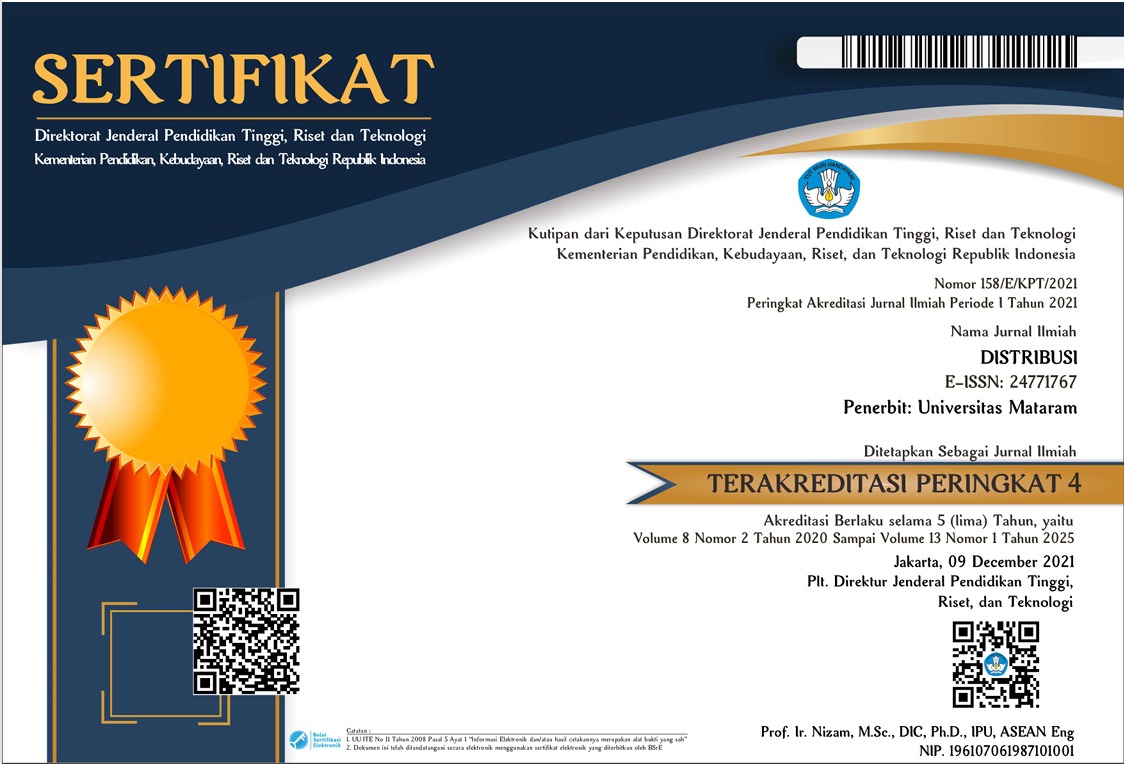FAKTOR YANG MEMOTIVASI PEREMPUAN DALAM BERWIRAUSAHA PADA UMKM KROPUK SANGNGNGAR DI KECAMATAN KWANYAR KABUPATEN BANGKALAN
DOI:
https://doi.org/10.29303/distribusi.v8i2.104Keywords:
Motivation, entrepreneurial women, Roasted CrackersAbstract
The study was conducted to determine the factors that motivate women in entrepreneurship at SMEs of roasted crackers in Kwanyar District, Bangkalan Regency. The population in this study was female entrepreneurs in SMEs of roasted crackers. The approach used is descriptive qualitative, where data are collected through interviews with 45 women entrepreneurs. There are 3 factors that motivate women entrepreneurs: 1). Family Factors (Confidence Modalities), 2). Intentional Factors (Emotion Modalies), 3). Tension Modalities. Based on the results of the study it turns out that the Family Factor (Confidence Modalities) is a factor that motivates women in entrepreneurship, while the family factor in question namely heredity has an internal strength in supporting and motivating women in entrepreneurship. This condition is supported by a family environment that is very thick in the spirit of entrepreneurship so as to facilitate and succeed them in doing business.
Downloads
References
Alwisol 2009, Psikologi Kepribadian, Edisi Revisi Malang :UMM Press
Ali, Abdel Hafiez & Ali Yassin Sheikh Ali. (2013). Motivational Factors Of Somali Women Entrepreneurs in
Benadir Region. Social Sciences and Humaities, Vol.4 No.1, 59-72 Ismail, Hasni Che., Faridahwati Mohd. Shamsudin & Mohammed S. Chowdhury. (2012). An Exploratory Study of Motivational Factors on Women Entrepreneurship Venturing in Malaysia. Business an d Economic Research, Vol.2 No.1, 1-13. Retrieved from Macrothink Institute.
Beck, T., Demirguc- Kunt, A., and V. Maksimovic.2005 “Financial and Legal Constraints to Firm Growth: Does Firm Size Matter?”, Journal of Finance, 2005, pp: 137-177
Bygrave, W.D. 1994. The Portable MBA in Entrepreneurship. Singapore: John Wiley & Son, Inc.
Gurbuz, G. & Aykol, S. 2008, Entrepreneurial Intentions of Young Educated Public in Turkey. Journal of Global Strategic Management, 4(1): 47-56.
Herdiman, F.S. 2008.“Wirausahawan Muda Mulai dari Lingkungan keluarga”. http://jurnal nasional.com/media, diunduh pada tanggal 12 Maret 2011.
Lieli Suharti dan Hani Sirine ,September 2011” Faktor-Faktor yang Berpengaruh Terhadap Niat Kewirausahaan (Entrepreneurial Intention) “Jurnal Manajemen Dan Kewirausahaan, Vol.13,No.2 http://puslit2.petra.ac.id/gudangpaper/files/2050.pdf
Sari,My(2013) analisis pemahaman kewirausahaan terhadap motivasi mahasiswa menjadi young entrepreuner (Studi Kasus Pada Mahasiswa Program Studi Manajemen Ekstensi Fakultas Ekonomi Universitas Sumatera Utara. Tidak diterbitkan.
Rosmiati et al. (2015). Sikap, Motivasi, Dan Minat Berwirausaha Mahasiswa. JMK. 17(1), 21-30.
Sugiyono. (2009). Metode Penelitian Bisnis (Pendekatan Kuantitatif, Kualitatif, dan R&D). Bandung: Alfabeta.
Sugiyono. (2010). Metode Penelitian Kuantitatif, Kualitatif, dan R&D. Bandung: Alfabeta.
Endang, N. P. (2012). Analisis Faktor-Faktor Motivasi Berwirausaha Terhadap Keberhasilan Pengusaha UKM (Studi Pada UKM Kota 179 Malang). Jurnal Profit, 6(1), 63-68. Retrieved from Database E-Journal Fakultas Administrasi Universitas Brawijaya Malang.
Saiman, L. (2014). Kewirausahaan-Teori, Praktik, dan Kasus-Kasus (Edisi 2). Jakarta: Salemba Empat.
Yunal, V. O. dan Indriyani, R. (2013). Analisis Pengaruh Motivasi Berwirausaha dan Inovasi Produk TerhadapPertumbuhan Usaha Kerajinan Gerabah di Lombok Barat.
Segal, Gery., Dan Borgia & Jerry Schoenfeld.(2005). The Motivation to Become an Entrepreneur. InternationalJournal of Entrepeneurial Behavior & Research, Vol.11 No.1, 42-57. Retrieved from Emerald Group Publishing Company.
Downloads
Published
How to Cite
Issue
Section
License
Copyright (c) 2020 anugrahini irawati, Bambang Sudarsono

This work is licensed under a Creative Commons Attribution-ShareAlike 4.0 International License.
Penulis yang naskahnya diterbitkan menyetujui ketentuan sebagai berikut:
- Hak publikasi atas semua materi naskah jurnal yang diterbitkan/dipublikasikan dalam situs Jurnal DISTRIBUSI ini dipegang oleh dewan redaksi dengan sepengetahuan penulis (hak moral tetap milik penulis naskah).
- Ketentuan legal formal untuk akses artikel digital jurnal elektronik ini tunduk pada ketentuan lisensi Creative Commons Attribution-ShareAlike (CC BY-SA), yang berarti Jurnal DISTRIBUSI berhak menyimpan, mengalih media/format-kan, mengelola dalam bentuk pangkalan data (database), merawat, dan mempublikasikan artikel tanpa meminta izin dari Penulis selama tetap mencantumkan nama Penulis sebagai pemilik Hak Cipta.
- Naskah yang diterbitkan/dipublikasikan secara cetak dan elektronik bersifat open access untuk tujuan pendidikan, penelitian, dan perpustakaan. Selain tujuan tersebut, dewan redaksi tidak bertanggung jawab atas pelanggaran terhadap hukum hak cipta.









